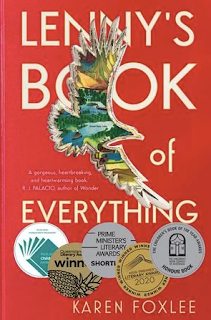See all the medal stickers on the cover of Lenny's Book of Everything? This is one of the most awarded and shortlisted books I've ever seen! It also comes highly recommended by many readers whose opinion I value.
I think I've found a new favourite author: Karen Foxlee is wonderful. She is Australian, but Lenny's Book is set in the US. Lenny is growing up in the 1970s in a small American town. Her father has disappeared and her mother is struggling to support Lenny and her little brother Davey. Except that Davey is not so little -- he has a rare form of gigantism, and he just won't stop growing. As Lenny and Davey collect each issue of their build-your-own encyclopaedia, Lenny falls in love with insects and Davey with birds of prey, and Lenny gradually begins to realise that their little family is under threat.
Poignant, gentle, thoughtful, beautifully written, and often wryly humorous, Lenny's Book of Everything belongs to a particular genre which I call Children's Book for Adults. I absolutely adored this novel but I'm not sure how many ten year olds would fall in love with it -- it's so sad! The author's note reveals that Foxlee has cared for a seriously ill relative, and the final chapters of Lenny's Book ache with that experience.
It also powerfully reminded me of growing up in the 1970s with my Hutchinson's New Twentieth Century Encyclopaedia as the fount (font? fount?) of all knowledge -- I must have read that single volume from cover to cover a dozen times. Until the dawn of the internet, so well into the 1990s, I also used it as my main reference for my weekly general knowledge crossword in The Age. Those were the days, when everything you would ever need to know could be contained within a single set of covers.
Lenny's Book of Everything was one of my favourite reads of 2021.


















